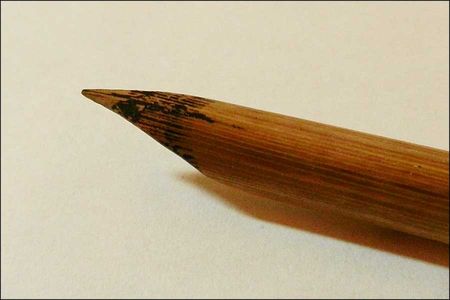FWP:
SETS == POETRY;
REPETITION; SYMMETRY
DESERT: {3,1}
LOSING/FINDING: {4,6}
ROAD: {10,12}
For background see S. R. Faruqi's choices. This verse is NOT one of his choices; I thought it was interesting and have added it myself. For more on Ghalib's unpublished verses, see the discussion in {4,8x}.
This closing-verse is one more of the young Ghalib's many tributes to Bedil; on Ghalib's deep admiration for Bedil, see {8,5x}.
Bedil's pen is equated with Khizr's staff-- they are both, it seems, guides on the road of poetry. But it's also possible that Ghalib is imagining himself as Bedil's heir; on this reading, Ghalib wouldn't fear getting lost, because he himself now had the 'pen of Bedil' that would act as Khizr's staff, so that he himself was now a kind of Khizr of the 'desert of poetry'.
Alternatively, if we take be-dil as a word, the pen of 'a heart-less one'-- a lover who had lost or given away his heart, not one who was 'heartless' in the usual English sense-- might be the key to right guidance in the 'road of poetry'.
And Ghalib didn't in any case show much respect to Khizr:
consider the patronizing view of {159,6},
or the denunciation in {234,3}.

Asi:
Oh Ghalib, in the road of poetry I have no fear of losing the road, because I am a follower of Bedil, and for me the pen of Bedil does the work of a staff in the desert of poetry.
== Asi, p. 64